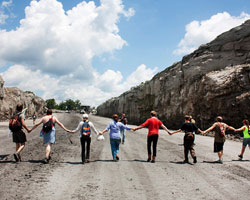Live from West Virginia
 RAMP
RAMPNothing like a little excitement to liven up a reporting trip. I was in southern West Virginia in late July to cover the lead-up to and the biggest action on a mountaintop removal (MTR) mining site to date. On July 28, 45 activists walked onto the largest MTR site in West Virginia, Hobet 45 in Lincoln County, dropping banners, locking themselves to machinery and hiding in trees; 20 were arrested.
RAMPS—Radical Action for Mountain People’s Survival—put out the call for activists to come to a training camp on a sheep farm in Nicholas County in preparation for what they were calling “a mass mountaintop removal mine site walk-on” to shut down operations for as long as possible and raise awareness of the practice, in which mountain ridges are dynamited to get at the coal seams beneath and the resulting rocks and soil are dumped in valleys below. So far more than 500 ridges have been destroyed and more than 2,000 miles of streams have been buried. Several scientific, peer-reviewed studies over the past few years show a significant increase in both cancer and birth defects among residents of communities near MTR sites as compared to similar communities not near such sites, although no direct connection has yet been proven.
RAMPS’ mission statement declares opposition to all forms of surface mining (including MTR), though many of the activists—both locals and out-of-staters—say all forms of coal mining are detrimental to the health and well-being of West Virginians and the planet as a whole, due to coal’s contribution to climate change when burned. Of course those employed by the mining industry beg to differ.
On the day of the action there was some thoughtful, respectful dialogue between miners and their families on one side and MTR opponents on the other at a rally at a park in Charleston (a diversionary tactic that worked pretty well at keeping a lot of pro-coal folks away from the action on the mine site). But there were also a lot of threats and intimidation, both on the mine site and later. Twenty-five activists who were not arrested had to walk a gauntlet of angry miners for about seven miles, which one participant described as the most hostility he’d experienced in 40 years of activism.
That evening, the organizers were in Charleston (about 90 minutes from the action and 90 minutes from training camp in another direction), trying to track down all of those arrested and deal with a barrage of media calls. When some folks tried to head back to camp late at night, they were advised not to by the farm’s owner, James Tawney, who runs a sheep farm and is outspoken in his own views against MTR, because angry neighbors had felled trees to block the road and shot off guns near the property. James is well-armed himself and not afraid to defend his family and his land. I wouldn’t be surprised if many of the activists who espoused and carried out nonviolent direct action on Saturday were thrilled to have James as their first line of defense.
Folks were able to return Sunday morning (the trees had been moved) and joined others for a debriefing. Some talked about being traumatized by the violence of MTR itself—where mountain ridges are dynamited to get at the coal seams beneath, with tons of rocks and soil flying up and being dumped in valleys, often burying streams—and by the damage it’s doing to local communities. Others had been affected by the tension and fear of personally confronting angry workers who fear the loss of their livelihood if MTR sites are closed down.
Toward evening a group of angry neighbors/miners breached the property line and things were tense. Some folks wanted to invite them for dinner (homemade pizza was almost ready), but others nixed that, saying the intruders had also been drinking and things could get ugly. Some of the RAMPS leaders spoke to the men, and after half an hour or so they moved away. James called the cops, and two patrol cars escorted those of us wanting to leave down the long, winding dirt road to the highway. (Turns out one of the trees cut down was on one of the officer’s property, and was he pissed.)
I was in that mini-caravan, headed to a motel in the nearest town, Summersville, about 16 miles away, where I could get phone service and get on the internet to file my first story, and take a shower—none of which had been available at the camp which had been my home base for five days as I interviewed activists and walked in the beautiful, diverse, green forest. No drought here, in fact the opposite, as raging thunderstorms had swept through several times in the past month.

